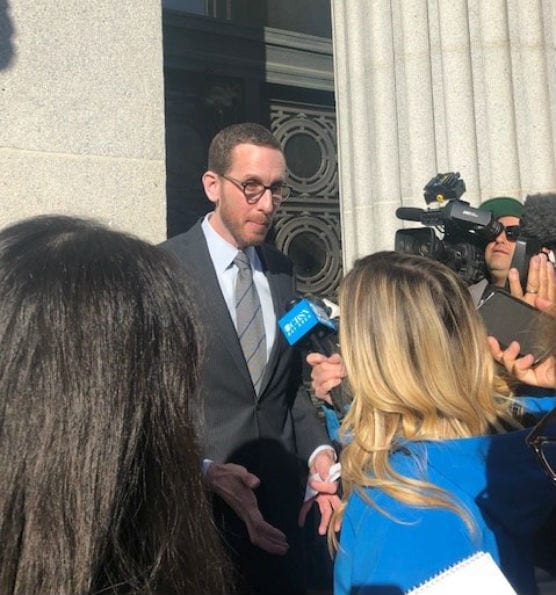OAKLAND – Looking to revive twice-failed legislation to address California’s urgent housing crisis, a Democratic state senator introduced changes to a controversial housing bill Tuesday that he and supporters hope will finally get it past the finish line this year.
Speaking on the steps of Oakland City Hall, Sen. Scott Wiener, D-San Francisco, unveiled amendments to his proposed Senate Bill 50, which would override local zoning rules to encourage construction of four-to-five-story apartment buildings near public transit stations.
“We have a multimillion home shortage in the state of California,” Wiener said. “We need more housing of every variety and Senate Bill 50 will help us do that.”
Despite strong support in some circles, prior iterations of SB 50 failed in 2018 and 2019. The housing bill faced fierce opposition from several cities and organizations such as the League of Cities, which opposes forfeiting local control over housing-development decisions to the state.
The revised legislation attempts to address that issue by giving cities two years to create their own alternate plans for meeting the goals of SB 50.
“We’re giving cities more flexibility to adopt plans that work for them locally,” Wiener said.
Under the amended bill, cities can stray from specific SB 50 requirements as long as they comply with three principles. The local plans must permit as much new housing as the SB 50 would zone for, not increase miles traveled by vehicles, and not violate fair housing principles, such as concentrating new housing disproportionately in low-income communities.
The legislation would allow cities to build taller in one area but shorter in another, or denser in one area but less dense elsewhere, as long as they comply with those three principles. It also lets cities add their own provisions to housing plans, such as ensuring that existing residents have priority access to affordable housing. State agencies would have to certify each city plan’s compliance with the law.
“We’ve heard loud and clear that cities want the flexibility to implement this kind of legislation in a way that works best for them,” Wiener said in a statement following his announcement Tuesday.
The senator also touted new endorsements for his revised housing bill, including from Culver City Mayor Meghan Sahli-Wells, Carson Mayor Albert Robles and Pacoima Beautiful, a San Fernando Valley-based environmental justice group.
Not everyone is on board with the revised housing bill, however. Protesters surrounded Wiener’s press conference in Oakland on Tuesday, shouting, “Affordable housing now” and “Hey hey, ho ho, luxury housing has got to go.”
The protesters argued that Wiener and other state and local leaders must dedicate more resources to build affordable housing, rather than market-rate and luxury housing.
Members of the group Moms4Housing, which currently occupies a vacant West Oakland home owned by a Southern California real estate company, demanded Oakland Mayor Libby Schaaf, who supports SB 50, stop green-lighting luxury housing while the city faces an unprecedented homeless crisis.
Speaking after the press conference, Moms4Housing member Misty Cross, an African-American mother of three, said it’s no coincidence that certain ethnic groups are hit hardest by the affordable housing crisis.
“It’s all by design,” she said.
Cross is one of several mothers waiting on an Alameda County judge’s ruling on whether her group will be evicted from a home at 2928 Magnolia Street in West Oakland, which the mothers have occupied since Nov. 18.
Carroll Fife, director of the Oakland/San Francisco Alliance of Californians for Community Empowerment, blasted the rapid construction of luxury and market-rate housing in Oakland as the city’s homeless population grew 47% from 2017 to 2019.
“You’re not building housing for people who make less than $40 an hour,” Fife said.
Despite that criticism, Oakland’s mayor touted the city’s work in tackling the housing crisis while speaking in support of SB 50 at Wiener’s press conference Tuesday.
“Oakland has set an example of how parts of SB 50 do work,” Schaaf said. “In the last few years, we’ve built seven times more housing. We’ve seen skyrocketing rents stabilized. We’ve seen dramatic reductions in evictions, but we’ve seen homelessness grow.”
Schaaf said cities like Oakland cannot combat the state’s pressing housing crisis alone. California has 3.5 million fewer homes than it needs to house people, according to an October 2016 report by the McKinsey Global Institute.
“This is a big systemic problem that requires bold, statewide action,” she said.
Another bill pending in the California Assembly would create a “right to housing” for every child and family in the state. Assembly Bill 22, authored by Assemblywoman Autumn Burke, D-Los Angeles, would provide assistance to those facing eviction, including payment of rent and utilities, legal representation and connection to services to help prevent children and families from becoming homeless.
Both bills must pass the Senate or Assembly by Jan. 31 in order to advance.
— By Nicholas Iovino, Courthouse News Service
Like this:
Like Loading...
Related





 Tweet This
Tweet This Facebook
Facebook Digg This
Digg This Bookmark
Bookmark Stumble
Stumble RSS
RSS


























REAL NAMES ONLY: All posters must use their real individual or business name. This applies equally to Twitter account holders who use a nickname.
0 Comments
You can be the first one to leave a comment.